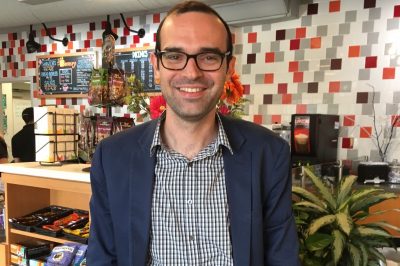On Thursday, September 21, UConn’s English department, in conjunction with the department of Literatures, Cultures & Languages, hosted Jonathan Culler, a renowned literary theorist and Class of 1916 Professor of Literature at Cornell University. In his lecture, Dr. Culler discussed his book Theory of the Lyric originally published in 2015, but released in paperback in October of this year. Theory of the Lyric focuses on the lyric tradition in Western poetry from ancient Greece to the twentieth century. In less than an hour Culler discussed not only the conventions of lyric poetry, but the challenges associated with analyzing it.
As Culler put it, lyric poets “produce poems that make claims about the world”. To make these broad claims, lyric poetry employs features that are not found in ordinary speech acts. In other words, “lyric poetry does not imitate a person’s voice, but rather, voices something [that is of lyric poetry…] itself.” For this reason in lyric poetry, the simple present tense works in contexts that would never work in day-to-day speech. In ordinary speech, Culler says, we use the progressive present tense, such as, “I’m walking to school” as opposed to the simple present tense declaration, “I sit in the pub, I drink the liquor,” the latter being examples of speech that we would only hear from a foreign speaker or in poetry, Culler says. This use of the simple present tense “lifts us into a special poetic register” of descriptive subjectivity, a distinctive trait of lyric poetry.
Despite the importance of the modes of subjective description that inform and are even constitutive of the genre, Culler raises a problem that affects students and educators alike when it comes to the reading of lyric poetry: Does trying to answer the question of who is speaking actually help our understanding or experience of the poem? Culler argues that “No, in fact, we must experience the progression. Working out who is speaking actually obscures the experience rather than clarifying it.” In an academic context, we are tempted to worry about who is narrating the poem and in uncovering the narrator’s motive. However, “a hypothesis of an imagined speaker is useless,” Culler concluded, “it would be a diversion” in terms of trying to understand the poem, its themes, temporalities, and the point of view it expresses. He added that good “critics focus on what the poem is doing rather than on the perspective of an alleged speaker.” Meaning, Culler wants us to shift our attention from the singer of Whitman’s Song of Myself to the agency of the lyrics themselves.
Department News
This category captures all the news related to the department.
Graduate Feature: Meet William Stark
William Stark, a Ph.D. candidate in the Spanish Studies section, has come a long way from his native Colorado to pursue research in contemporary Chicano and Latino performance art and cultural production. The fourth year student is writing his dissertation on transcultural performance by Latino and Chicano performance artists in the United States and Mexico. These include Guillermo Gómez-Peña, Coco Fusco, Violeta Luna, Roberto Sifuentes, and the performance-collaborative La Pocha Nostra. Stark’s research explores how their aesthetic projects critique hegemonic discourses in the US.
Winner of the Outstanding Scholar Award from faculty in the Spanish program last spring, and recipient of an LCL Summer Pre-Doctoral Scholarship, William used his awards to interview Guillermo Gómez-Peña, Balitronica (aka the “Phantom Mariachi”), and Emma Tramposch in San Francisco. While there he had the opportunity to attend a gala hosted by RADAR Productions, a non-profit that produces literary happenings in the Bay area, and provides a platform for queer and outsider writers and artists whose work reflects the diverse experiences of the LBGTQA community. He later flew to Santa Fe, New Mexico, where he had the opportunity to participate in one of La Pocha Nostra’s legendary radical performance pedagogy workshops.
Stark’s dream has not always revolved around an academic career. He has been interested in painting and writing and music and is also passionate about cooking. From a young age he worked in restaurants and eventually became a professional cook. Later, he became a chef in Seattle, during the period, in the 1980s, when the city was becoming the culinary capital of Washington State. He would go on to cook professionally in Ireland and Ecuador. It was during his time in Ecuador that he learned to speak Spanish. The ex-French major explored a lot of South America, traveling all the way from Ecuador to Tierra del Fuego and back, mostly by just walking and hitchhiking! When I asked him if he misses his days as a chef he admitted that it was an exciting profession, but an exhausting one. He feels his academic career brings him deeper gratification and is less stressful. One of the main challenges he has found in academia is staying focused since he tends to express his ideas through painting and music at the same time. UConn has helped him to learn how to channel his energies and thus to gain a more profound understanding of his topics. He enjoys the diversity of the faculty’s interests as well as the fact that everybody in the department is very research-oriented and academically curious.
Besides working on his teaching and dissertation, Stark is involved in numerous collaborations. He was one of the cofounders of The Quiet Corner Interdisciplinary Journal, and now serves as the Editor for La Ojuela Research Project, a group that produces and disseminates knowledge about the history of the Compañía Minera de Peñoles’ silver lead mine, La Ojuela, in Durango. William feels personally connected to this project, as his paternal great-grandfather, Hugh Callory Watson, was a superintendent at the mine at the beginning of the Mexican Revolution.
Stark has already started working on his résumé and to apply for jobs and is looking forward to seeing what the future holds for him. His ideal job, he says, would be a small Liberal Arts college where he can teach and have time to work on his research. He intends to focus on Chicano and Latino cultural production/performance and its intersection with indigenous performance.
Professor Nan Meng Joins Chinese Program
Nan Meng joined the LCL’s Chinese section as Assistant Professor in Residence last Fall, after having studied and worked in four other universities in the US. Professor Meng received her B.A. in English Language and Literature at Shandong University, her hometown in northeastern China. She moved to the US to do her M.A. in Teaching English as a Second Language at Bowling Green and completed her Ph.D. in Chinese Pedagogy at Ohio State. She realized that she wanted to become an academic while pursuing research as a graduate student. She has lived in Connecticut for four years after having worked at both Yale and Wesleyan. Before coming to UConn, she also spent a year working at the Department of Asian Studies in Pennsylvania State University. For Professor Meng, Penn State and UConn have a lot in common, as they are both public institutions outside of big cities. She loves working at UConn’s LCL department because of its friendly environment and great diversity.
This semester she is teaching three courses in Chinese culture and language. Some of her classes are very popular with enrollments of over 130 students, so managing such large groups is sometimes a challenge. Her classes include lectures, group presentations, hands-on group projects, discussions and online work. She is happy to see that UConn students are very energetic and active. In collaboration with the other faculty in her section, she helps organize group activities to celebrate the Chinese New Year and other cultural events with her students.
American students find it hard to learn Chinese because of the cultural differences and because the language is very different from English. She teaches Mandarin Chinese, the most commonly used language in China, which is spoken by around two thirds of the country’s population. Professor Meng also speaks some Japanese and French. Her research focuses on language socialization and the development of intercultural competence stemming from her interest in how people acquire competence in different cultures. Other areas of expertise include teacher education, sociolinguistics and computer-assisted language learning.
Since Professor Meng specializes in intercultural competence, I asked her about cultural differences in China and the US. A main difference is the relationship between professors and students. In China, professors are seen as absolute authorities. Even though questions are welcome, students tend to avoid challenging them and certainly do not negotiate. Most graduate students in China work and study in a similar fashion as in the US, typically as TA’s or RA’s. However, tuition fees at Chinese universities are not as high as in the US. Due to cultural differences, she says, it can be difficult for foreigners who study in China to mingle with the locals.
Professor Meng belongs to the first generation of the one-child policy in China (which started in 1979 and was lifted in 2015). Although she does not have any siblings, she is very close to her cousins. Whenever she has the chance, she visits them in China. When she worked with a study abroad program at another university, she used to go every year. Because she has been away from her home country for so long, when she does go back home she experiences “reverse culture shock”. For instance, because of the intensity of the traffic, she doesn’t like to drive there. She laughingly admitted that she doesn’t like taking the subway in Beijing either because it is always packed. As a result she ends up just walking everywhere. She has two children and likes taking them home so that they can experience Chinese culture and spend time with their relatives. In her spare time, she likes playing the violin, attending classical music recitals, and cooking Chinese as well as international dishes.
By Adriana Alcina
MLA specialist Tracy Hartman to explore alternative careers for Humanities PhDs next week
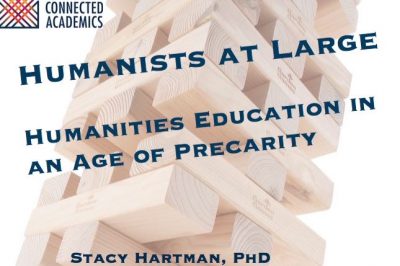 Next week Dr. Tracy Hartman will be visiting UConn to engage graduate students and faculty about expanding their understanding of the career possibilities for those pursuing PhDs in the Humanities. Dr. Hartman comes to UConn from the MLA, where she serves as Project Coordinator for Connected Academics (https://connect.mla.hcommons.org/) whose mission is to “support initiatives aimed at demonstrating how doctoral education can develop students’ capacities to bring the expertise they acquire in advanced humanistic study to a wide range of fulfilling, secure, and well-compensated professional situations” thanks to a grant from the Andrew W. Mellon Foundation which is slated to run through 2019.
Next week Dr. Tracy Hartman will be visiting UConn to engage graduate students and faculty about expanding their understanding of the career possibilities for those pursuing PhDs in the Humanities. Dr. Hartman comes to UConn from the MLA, where she serves as Project Coordinator for Connected Academics (https://connect.mla.hcommons.org/) whose mission is to “support initiatives aimed at demonstrating how doctoral education can develop students’ capacities to bring the expertise they acquire in advanced humanistic study to a wide range of fulfilling, secure, and well-compensated professional situations” thanks to a grant from the Andrew W. Mellon Foundation which is slated to run through 2019.
The events include a workshop for graduate students on February 1 and 2 that will each run from 4:00-5:00 pm. Dr. Hartman will also be holding a workshop for faculty on February 2nd at noon. In addition Dr. Hartman will give a talk on the importance of Humanities PhDs in the current economic and political context. that will take place on Wednesday, Feb 1 from 1:30-2:30 pm at the Class of 1947 room at the Homer Babbidge Library. The events are sponsored by LCL, the English Department, the Dean’s Office for CLAS and the UCHI.
Visiting Assistant Professor in French and Comparative Literature
Christopher Bonner joined the faculty of LCL this past fall to teach courses in French and Comparative Literature. He specializes in postcolonial studies and French Caribbean literature, and he seeks in his research to think through the relationship between literature and politics.
He completed his dissertation, The Alignment of Writing: Geopolitics and Literary Form in Cold War French Caribbean Literature, at NYU in 2015. In it, Bonner argues that the Surrealist-inspired avant-garde poetry that had been the touchstone of colonized black writers in the 1940s gave way, in the mid-1950s, to topical, referential prose as the prime vehicle for emancipatory politics in the French Caribbean. This formal shift, he shows, reflected a radically changed understanding of what it meant to write engaged literature, as authors adapted to a new, bipolar world order. Professor Bonner’s next book project builds on his first, but focused on modes of contemporary political engagement and resistance. In his new project, he will address the ways in which the critical strategies underlying the notion of “cultural politics” are themselves being challenged by living writers and theorists in the Caribbean. He has published his scholarship in the journal Small Axe, and has an article forthcoming in the upcoming issue of the International Journal of Francophone Studies.
Bonner grew up in Philadelphia, but has lived in New York City for most of his adult life. He completed his undergraduate degree at Columbia University in 2005. He has had a particularly rich experience with respect to teaching. He admits that a high school teacher, Ms. Mulherin, was largely responsible for inspiring the love of French and Francophone culture that lead him to the path of a career in Francophone literatures. After completing his B.A, at Columbia, he decided to become a New York City Teaching Fellow, during which he taught middle-school English in the South Bronx. Nearly all of his students were disadvantaged, struggling with a combination of poverty, undiagnosed learning disabilities, and unstable home situations. He was forced to learn to take charge of classroom discipline quickly, but more importantly, he says that his “eighth graders taught me the value of empathy. I began to see the classroom as a site for exchange and mutual learning, both among students and between students and myself.” Building a culture of empathy and solidarity have since become principles of his teaching, which Professor Bonner feels are especially important in foreign language classrooms. When voicing ideas in a second language, “students have to feel comfortable enough to risk making mistakes.”
While here at UConn, Professor Bonner will be offering an impressive range of courses, including classes on Global Cinema and World Literatures for the Comparative Literature and Cultural Studies program plus courses in literary theory, literature, and conversation classes.
A SNAPSHOT FROM LAST WEEK’S LANGSA CONFERENCE: RYAN EVELYN PRESENTS
On Friday morning at the LANGSA conference during the panel centered around Queer migrations, LCL graduate student Ryan Evelyn delivered his paper, “Small Places, Voiceless Faces: Ambiguity and Cultural Displacement in Two Novels by Gide and Guibert.” Ryan discussed gender representations, specifically the representation of masculinity in homosexuality as well as the concepts of cultural migration and spatial dichotomy in the two novels Les Faux-Monnayeurs, written in 1925 by André Gide, and À l’ami qui ne m’a pas sauvé la vie, written in 1990 by Hervé Guibert. Ryan went on to compare and contrast the spatial representations of homosexuality in the two novels, making the distinction between the private domain and public domain. Through his analysis, Ryan demonstrated the migration from the private to the public domain that took place in time between the publications of the two novels. Ryan’s research brings to light questions of self-acceptance and marginalization, ideas that remain pertinent to discussions of identity within the homosexual community.
Ryan Evelyn is a second-year Master’s student studying French and Francophone literature in the Department of Literatures, Cultures, and Languages at the University of Connecticut. Though his research focuses primarily on the Early-Modern and Renaissance periods, he dabbles in literature of the 20th century. Gender, representations of masculine homosexuality, and spatial dichotomies remain at the forefront of his research.
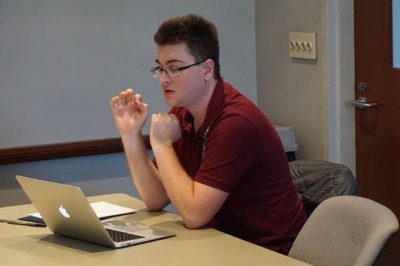
A Visit From Raul Aguiar
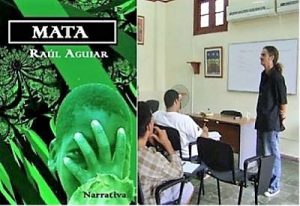
On Monday, October 24th Cuban poet Raul Aguiar visited UConn’s Latin American Cultural Center to give a talk and workshop on the manipulation of the Spanish language within fictional writing.
Aguiar’s narrative writing seminars usually take place at the state-owned Onelio Jorge Cardoso Literary Center named after the famous Cuban storyteller and located in Habana. Classes are free of charge and provide Cuban students with the opportunity to learn about narrative techniques and the great classics of the history of Hispanic literature while practicing their storytelling skills in an interactive and amusing way. Even though the center is not lucrative, the author thinks its near-future existence is not threatened. The center often hosts prestigious writers such as José Saramago and features annual, short-fiction competitions in which the winners receive funding for their writing projects and have the possibility of publishing them afterwards. Over 1000 students have graduated from the center, among them LCL graduate student, Milena Almira.
We were excited by the diverse audience and relaxed environment of the event. Aguiar explained, in Spanish, “English is magnificient to speak of business, German to talk about war, French and Italian to talk about romance, and Spanish to speak with the gods.” Aguiar then engaged undergraduate students, graduate students, and faculty in a conversation on the flexibility that exists within the syntactical structures of the Spanish language. Aguiar argued that Spanish offers an almost infinite liberty to exchange phrases and verbs, changing where the weight of the phrase lays, in order to convey different meaning or evoke various feelings in the reader.
During his workshop the novelist reflected on Cuban literary trends within the last decades. According to Aguiar, his generation avoided conflicts. This prepared the ground for topics that had never been examined before, such as youth diversity. He also spoke about how the current generation of Cuban writers likes experimenting with different literary genres and writing shorter stories due to the influence of blogs and social media platforms such as Twitter. Aguiar’s most recent work, by contrast, has been inspired by his love for hard rock music. While listening to it in English, he wrote La estrella boca arriba, a book about rock bands and the symbols surrounding them. A new edition of his novel has just been published in Spanish.
Aguiar also offered valuable advice to us as writers. All of us, whether student or faculty, have experienced writer’s block. Aguiar explained that when this happens the best thing to do is to revert back to the most simple sentences to express our thoughts. Upon getting the idea on paper, we can then start to re-order phrases and words to better evoke feeling and voice behind the language.
If you would like to support the center or learn more about Aguiar and his work, please contact Professor Jacqueline Loss at jacqueline.loss@uconn.edu.
Phoebe Giannisi presents HOMERICA at UConn
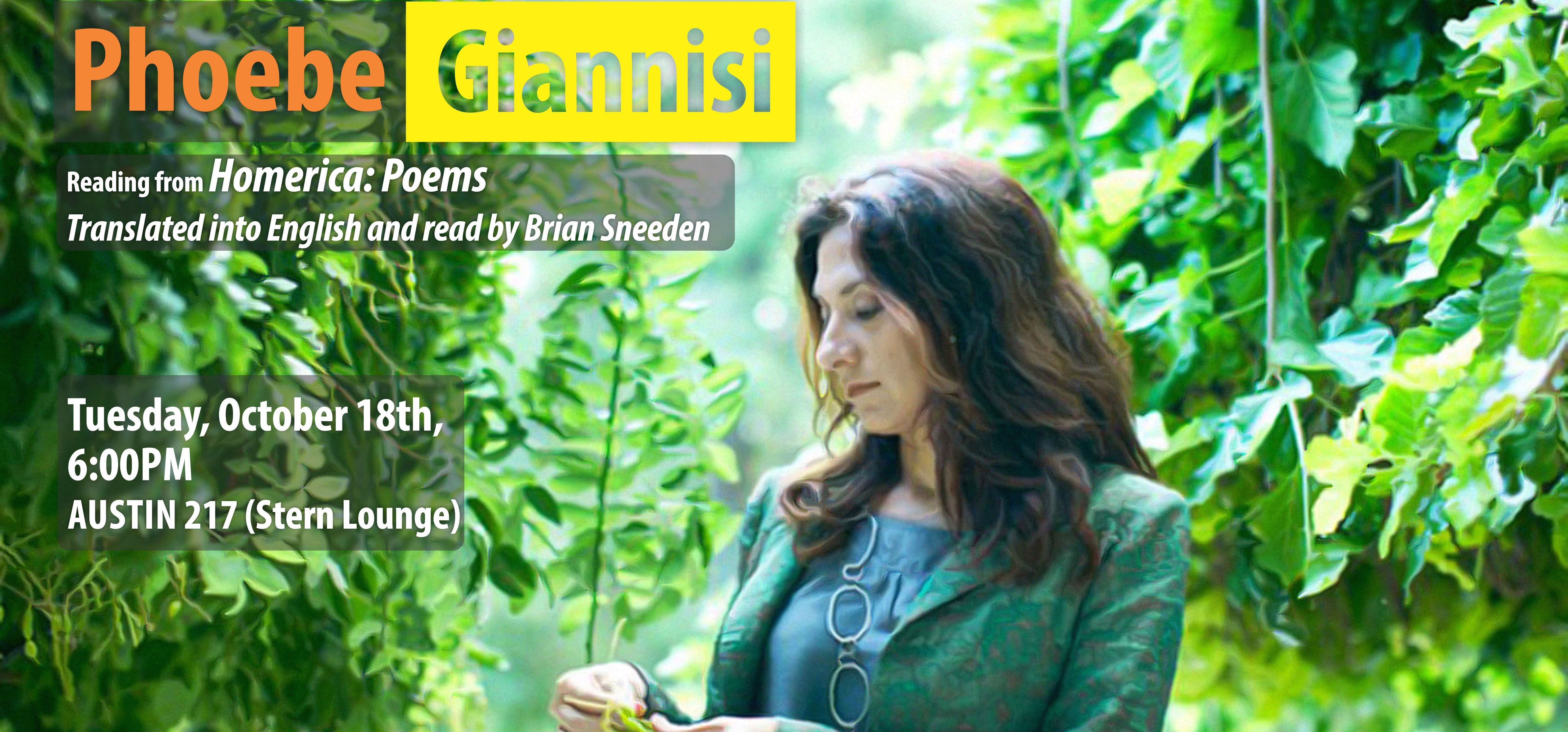 On October 18th internationally renowned Greek-poet Phoebe Giannisi came to UConn to offer a reading of her dramatic performance of poetry. The event was co-organized by the Literary Translation Program, launched by LCL Professor Peter Constantine, and the Creative Writing Program. Giannisi presented various poems of her book Homerica in Greek, while her translator, the UConn Ph.D. student in English and Literary Translation Studies, Brian Sneeden, read them in English. Many of Giannisi’s poems evoke or are named after Classical Greek mythological figures such as Achilles, Penelope and Orpheus. Among the highlights of her performance was her original piece Tettix (‘Cicada’ in Ancient Greek), which talks about erotic desire, poetry, melody inspiration, metamorphosis, and death. While writing the poems, Giannisi described her care for how the poem would be heard rhythmically, at the border of song and reading. Since Homeric poetry was recited by heart with very strong rhythmic patterns, she thought of making a DVD that would accompany her book. In this way, while listening to the poems, the audience could see the locations where the poems were recorded in Mount Pelion in Greece, creating a compelling audiovisual experience that captured the special atmosphere of each place. Tettix is one of Giannisi’s most successful works and was exhibited in the National Museum of Contemporary Art in Athens.
On October 18th internationally renowned Greek-poet Phoebe Giannisi came to UConn to offer a reading of her dramatic performance of poetry. The event was co-organized by the Literary Translation Program, launched by LCL Professor Peter Constantine, and the Creative Writing Program. Giannisi presented various poems of her book Homerica in Greek, while her translator, the UConn Ph.D. student in English and Literary Translation Studies, Brian Sneeden, read them in English. Many of Giannisi’s poems evoke or are named after Classical Greek mythological figures such as Achilles, Penelope and Orpheus. Among the highlights of her performance was her original piece Tettix (‘Cicada’ in Ancient Greek), which talks about erotic desire, poetry, melody inspiration, metamorphosis, and death. While writing the poems, Giannisi described her care for how the poem would be heard rhythmically, at the border of song and reading. Since Homeric poetry was recited by heart with very strong rhythmic patterns, she thought of making a DVD that would accompany her book. In this way, while listening to the poems, the audience could see the locations where the poems were recorded in Mount Pelion in Greece, creating a compelling audiovisual experience that captured the special atmosphere of each place. Tettix is one of Giannisi’s most successful works and was exhibited in the National Museum of Contemporary Art in Athens.
Trained in Architecture and Classics, Giannisi is an Associate Professor at the University of Thessaly in Greece and co-edits FRMK, a biannual journal of poetry, poetics, and visual arts. She has published five books of poetry and her poems present a spectacular range of styles covering three millennia of Greek history. She has a distinctive approach to poetry, as something “that comes out of the body and connects with the orality and musicality of language without following strict rules.” Her poems are written in a fusion of languages including Ancient and Modern Greek and local Greek dialects. Giannisi’s work lies between poetry performance, theory and installation, and explores the connections between language, voice, and writing with body, place, and memory. Brian Sneeden describes translating her poems as “a transformative experience.” He commented that “Phoebe Giannisi’s poems require a certain capacity for surrender – both in terms of how one experiences language and its perceived boundaries, but also in regards to the boundaries of English, which does not draw quite as easily as Greek from a vocabulary steeped in so ancient a history.”
For more information about her poetry, visit Giannisi’s website: phoebegiannisi.net
Internationally acclaimed Greek poet Phoebe Giannisi to offer a reading at UConn on Tuesday, October 18th
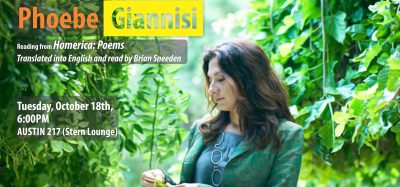 The UConn Literary Translation Program and Creative Writing Program present Pheobe Giannisi. Her event, HOMERICA, will consist of dramatic performances of poetry in Greek and English.
The UConn Literary Translation Program and Creative Writing Program present Pheobe Giannisi. Her event, HOMERICA, will consist of dramatic performances of poetry in Greek and English.
New American Writing compares Giannisi’s work to C.P. Cavafy and Jean Rhys describing it as “completely original […] a complete rethinking of the myths. Perhaps it would be more accurate to call Giannisi’s re-tellings ‘re-weavings’ because they alter the fabric of the stories.”
Giannisi is the author of five books of poetry, including Homerica (2009) which was recently translated into English by University of Connecticut PhD student, Brian Sneeden. She holds degrees from the University of Lyonn II- Lumière and the National Technical University of Athens, and is an associate professor at the University of Thessaly. She co-edits FRMK, a biannual journal of poetry, poetics, and visual arts.
Brian Sneeden, a PhD student in English and Literary Translation Studies, describes translating Giannisi’s work as “a transformative experience. Phoebe Giannisi’s poems require a certain capacity for surrender – both in terms of how one experiences language and its perceived boundaries, but also in regards to the boundaries of English, which does not draw quite as easily as Greek from a vocabulary steeped in so ancient a history.”
Modern bard Joe Goodkin revives the Odyssey
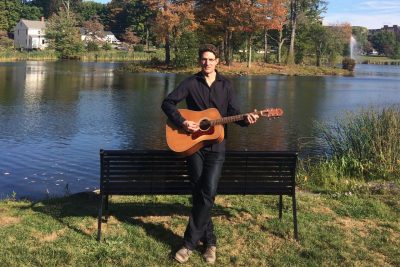 On Thursday September 29th Classicist-musician Joe Goodkin performed his original musical composition of the Homeric masterpiece, the Odyssey. During the event, hosted by Professor of Classics Roger Travis, Joe played his 30-minute continuous piece that deconstructs the story of the Odyssey in song.
On Thursday September 29th Classicist-musician Joe Goodkin performed his original musical composition of the Homeric masterpiece, the Odyssey. During the event, hosted by Professor of Classics Roger Travis, Joe played his 30-minute continuous piece that deconstructs the story of the Odyssey in song.
Goodkin put together a solo acoustic guitar and voice recital made of 24 original songs, whose lyrics are inspired by the epic book. His music is a fusion of mellow melodies, open-beat tunes and blues rhythms. He studied Ancient Greek at the University of Wisconsin-Madison and decided to combine his passion for the classics with his musical expertise after having written and recorded his own rock music. He has received several ASCAP Composers’ awards.
His UConn concert captivated the audience and following his performance, Professor Travis briefly spoke about the relevance of the Odyssey within the context of modern digital media. During the discussion, students asked Goodkin about his thoughts on the Homeric story as well as his musical background. Goodkin explained that each of his songs are an interpretation of the Odyssey and represent the personal perspectives of its main characters. He added that his songs pay tribute to the characters’ universal human dimension by recreating their feelings and experiences. Although he admitted that a lot of narrative inevitably gets lost when the book is turned into a series of songs, he said that his lyrics attempts to capture the emotional charge of the experience of hearing the epic poem as it was originally performed.
Since 2003 Goodkin has been on a tour at high schools and colleges across the US and Canada, and his UConn’s recital marked his 200th performance. His songs are available for purchase on iTunes and Spotify.
For more information, go to his website, www.joesodyssey.com
Adriana Alcina Gómez
